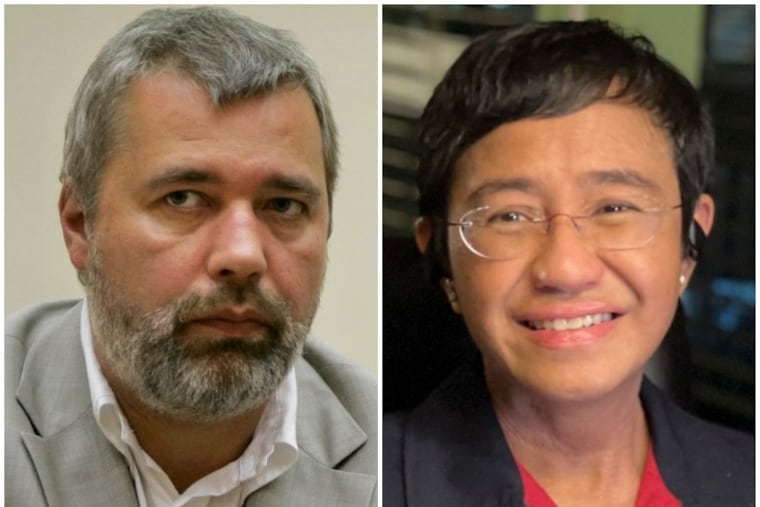Maria Ressa and Dmitry Muratov’s Nobel Peace Prize for defending press abroad should wake Americans up | Trudy Rubin
Muratov and Ressa are fighting for freedom of the press against official lies, corrupt social media, and attacks on the media that can happen here.

The symbolism of the 2021 Nobel Peace Prize goes far beyond its tribute to Maria Ressa and Dmitry Muratov, independent journalists fighting for freedom of expression in the Philippines and Russia.
“They are representatives of all journalists who stand up for this ideal in a world in which democracy and freedom of the press face increasingly adverse conditions,” said the Nobel Committee’s announcement.
Harassment, arrests, and even murders of journalists investigating the powerful are increasing globally and spreading from autocracies to flawed democracies. Reporters Without Borders lists 50 journalists killed in 2020. The threats to the fact-based press worldwide also include the spreading sewerage of social media that drowns truth with lies.
The choice of these particular journalists spotlights these points.
Muratov, editor-in-chief of the independent newspaper Novaya Gazeta, six of whose journalists have been killed while trying to investigate the powerful.
The award came exactly one day after the 15th anniversary of the murder of Anna Politkovskaya, the most internationally famous of the six, who was a fierce critic of the Kremlin’s wars in Chechnya and of Vladimir Putin. She was gunned down in a contract-style killing in the entrance hall of her apartment block in central Moscow — on Putin’s 54th birthday — which many Putin critics saw as a regime insider’s gift to the boss.
The killing has never been resolved, nor has an earlier, unsuccessful attempt to kill Politkovskaya by poison. The statute of limitations to charge those responsible for her death expired the day before the announcement of the Nobel Prize.
In 2012, I interviewed Muratov in Moscow in his office, and he railed at the fake investigations of Politkovskaya’s death that tried to pin it on flunkies or political opposition leaders. He also mourned the unsolved death, most likely by poison, of another colleague and investigative star, Yuri Shchekochikhin.
When informed he won the prize, Muratov said, “This is Novaya Gazeta’s. It is for those who died defending the right of people to freedom of speech.”
Some Kremlin critics have decried the choice to give the award to Muratov, believing it should have gone instead to Alexei Navalny, the opposition leader who barely survived a Kremlin poison attempt and is now jailed on specious charges. Indeed, an award to Navalny would have been a spectacular boost to the decimated opposition movement in Russia, where Navalny, along with almost all independent candidates for the legislature, have been banned, jailed, or forced into exile.
And Navalny himself is a brilliant investigative journalist, whose team has made astonishing videos revealing alleged corruption by Putin and other Kremlin leaders.
Other critics say the award should have gone to Novaya Gazeta itself, in tribute to the dead, rather than Muratov, whom they consider compromised because he operates in a gray zone where he still meets with Kremlin leaders. They point out that even on the day of the Nobel announcement, the Kremlin was adding several more reporters to its register of so-called “foreign media agents,” a classification used to crush almost all independent media.
The Kremlin congratulated Muratov on his award and has not yet applied that label to Novaya Gazeta. Putin may use the award to falsely claim that Russian media is free.
I wish Navalny had won. However, I see the award to Muratov as a not-so-subtle Nobel Committee message to democracies that he is a harbinger of their media future if they don’t get their acts together. Most Americans have yet to take that message to heart.
Just over a week before the Nobel award, the killer of five journalists at the Annapolis, Md., Capital Gazette in 2018 was sentenced to multiple life terms. Although the man had grievances against the newspaper, he had also tweeted: “Referring to @realDonaldTrump as ‘unqualified’ @capgaznews could end badly (again).”
» READ MORE: Trump must quit embracing autocrats who squash the press | Trudy Rubin
The murderous instincts of Trump followers cannot be taken lightly after the events of Jan. 6, as he intends to run again. Not only has he made “fake news” his mantra (as he spreads the Big Lie); not only does he label fact-based news “the enemy of the people” — but he has a record of encouraging violence against his critics. Who can forget how, when asked by talk show host Joe Scarborough about Putin’s killing of journalists, Trump replied, “I think our country does plenty of killing also, Joe.”
Moreover, the award to the courageous Maria Ressa, cofounder of the digital media company Rappler, which has relentlessly investigated the extra-judicial killings of President Rodrigo Duterte, holds another message for the United States and the West.
Ressa has been a sharp critic of Facebook’s role in spreading the lies and misinformation spewed forth by the autocratic Duterte. And she also attacks Facebook’s failure to enforce its own policies against hate speech in non-Western markets like India and Myanmar.
After getting the Nobel news, Ressa said she hopes for “energy for all of us to continue the battle for facts.”
The battle for facts is already raging full force in the U.S., and will only grow more furious in 2022 and 2024. The awards to Ressa and Muratov are a signal of where we could be heading if that battle is lost.